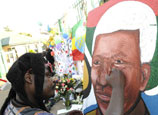
BEIJING, June 22 (Xinhuanet) -- Following is the transcript of the Xinhuanet's exclusive interview of UN Under-Secretary-General Peter Launsky-Tieffenthal:
Anchor: Good morning, dear netizens. Welcome to Xinhuanet interview. Today we are honored to have invited His Excellency Peter Launsky-Tieffenthal, UN Under-Secretary-General to Xinhuanet.
Mr. Launsky, thank you for giving this exclusive interview to Xinhuanet.
Peter Launsky-Tieffenthal: Thank you so much for having me here in the programme.
Anchor: Mr. Launsky, have you ever visited China before?
Peter Launsky-Tieffenthal: Yes. I have the opportunity more than 20 years ago. I travelled with a group of friends across China, coming from Karakoram highway in Pakistan, all the way to Turpan ,Urumchi, Dunhuang, Lanzhou, Xi'an, Beijing, Shanghai, Hong Kong, back to India that time. So I have wonderful memories with the journey along the roads, by train and by plane. And we had wonderful memories.
Anchor: Any different feeling this time?
Peter Launsky-Tieffenthal: Well, the different feeling this time because we came directly from New York to Beijing, it's amazing what has been happening in those 20 plus years in terms of development, in terms of the city has been built, public transportation, fantastic architecture. And it's amazing within that short period of time how the city has changed, but without losing its character, and without losing its charm.
Anchor: What are your purposes of this visit to China?
Peter Launsky-Tieffenthal: As you imagined for the United Nations, the relationship with China is a very important one. We are trying to tell the story of what the United Nations do across the world, in as many languages as possible, and the most important one being Chinese. And we are very happy with our relationship with Xinhuanet, and Xinhua as a whole to be able to share the story with the Chinese speaking public.
Anchor: How do you comment on the partnership between Xinhua News Agency and the United Nations in recent years?
Peter Launsky-Tieffenthal: First of all, we are very happy that as many as ten of your correspondents are based in UN headquaters in New York. We are meeting them on a daily basis, and we are grateful for them to share their stories in images, in video, or in texts with a very wide public back home in China.
Anchor: Mr. Launsky, in your opinion, how to use the new media to promote public understanding of the United Nations?
Peter Launsky-Tieffenthal: For the Untied Nations, the big challenge is to find good balance between traditional media and social media.
Many of our followers around the world do not yet have access to social media, that's why we have to emphasize radio and television. But the increasing number of young people, and we are happy to hear it's the case in China too, are following us by social media, and that's why our social media accounts that be followed by Chinese youth have the largest number of followers, as compared to any other parts of the world.
Anchor: Mr Launsky, what measures do you think the international community should take to ensure cyber security?
Peter Launsky-Tieffenthal: Well, cyber security is one of those challenges that can only be faced jointly and since United Nations offers a platform to deal with global challenges, cyber security being such a global challenge, is also being dealt with by the United Nations.
Anchor: As the coordinator for multilingualism, how to promote balance of six official languages in the United Nations? What measures have been taken?
Peter Launsky-Tieffenthal: For us to be able to tell a story of UN in as many languages as possible, at least in the six main languages, English, French, Chinese, Spanish, Russian and Arabic, ensures that we can reach the borders possible at public around the world. It is a challenge because you need a lot of colleagues to cover meetings in all those languages, but it also ensures our member states, 193 of them, are able to follow what is happening at the UN in their own specific language and that is important for us to make sure it happens.
Anchor: Mr Launsky, having toured Xinhuanet and talked to our staff, what impressed you most?
Peter Launsky-Tieffenthal: What impressed me most was the huge number of followers that Xinhuanet has in one month, if I remember correctly, more than 7 billion visitors, and not just visitors, but lots of them you and your colleagues interacting with, which is a big challenge for the UN. We too have a large number of visitors, but we find it difficult to respond to all of their questions. So that’s why I was most impressed to hear not just about the large number of followers but the many people you are able to interact.
Anchor: Mr Launsky, we know you have over 30 years of experience in foreign affair, how does these experience help your job as the UN Under-Secretary-General for Communications and Public Information?
Peter Launsky-Tieffenthal: Well, I joined the United Nations only eight months ago, I have worked for almost 30 years for the Austrian foreign service but many of my assignments had to do with information in a broader sense. I was responsible for the relationship with media while in India, I was put in charge for diplomacy while I was posted in Washington D.C., and before coming to New York, I was working as the spokesman for the Austrian Ministry for Foreign Affair. So many of my assignments during my diplomatic career focus on media and information, and in that sense, it is a fairly natural development even though in the new environment.
Anchor: OK, due to the time limit, our online interview has to stop now. Mr L, wish you a pleasant journey in China.
Peter Launsky-Tieffenthal: Thank you so much for having me. All the best to you and your followers. Thank you.
Anchor: Thank you for coming here to have this interview.
Peter Launsky-Tieffenthal: It is my pleasure.
















 A university graduate's shepherd career
A university graduate's shepherd career


![]()
